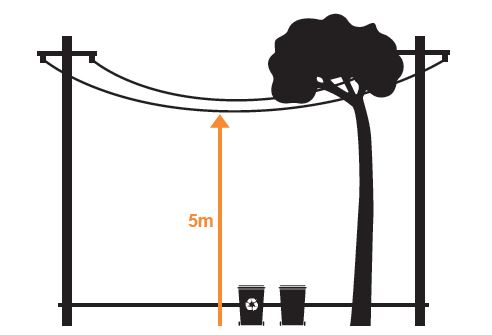Most residents have three bins:
- garbage (red lid bin)
- recycling (yellow lid bin)
- garden waste (green lid bin).
Bins are allocated to the property and remain the property of Sutherland Shire Council. Bins cannot be moved to another address. No unauthorised modifications/attachments are to be made to the bin. If the resident does make modifications or installs attachments to the bin, this is done so at the resident’s own risk and cost. If the bin is replaced, removed or stolen, Sutherland Shire Council is not responsible for the replacement of these attachments.
Placing your bins for collection
Place your bin on the kerb before 4am on the day of the collection. We still collect bins if your service falls on a public holiday. Collections may take place earlier than 4am on public holidays due to landfill opening hours. The bin lid opening should be facing the street.
There are four simple rules to follow.
1. Keep at least 30cm between each bin to ensure that the truck arm can grab each bin.

2. Place bins away from parked cars.
3. Don't place your bin under low hanging power lines or trees because this presents a potential safety hazard. A garbage truck contacting a live wire or tree can disrupt services to your street and is a risk to the community.
You need to look up and check there is enough space between your bin and any objects above.
That means estimating there is 4 metres clear space above your bin, or 5 metres above the ground.
If there isn't enough space, please move your bin to a safe location.
Bins placed under low power lines or trees will not be collected.

4. Don't overfill your bin and ensure the lid is closed to prevent pollution in your neighbourhood. Overfull bins or bins weighing more than 80 kg may not be collected.
We can't collect items placed next to, or on top of bins.
When is my bin day?
Check your bin day online or download a waste information booklet for your fridge. This includes a calendar with your bin collection days.
Contact us if you’re a resident of a large complex to find out your bin day as this may differ from single dwellings in your area.
Report a missed bin collection
After you've let us know about your missed bin, the turnaround for collection is:
- Missed garbage (red) bin: next working day
- Missed garden (green) or recycling (yellow) bin: the following week's collection day.